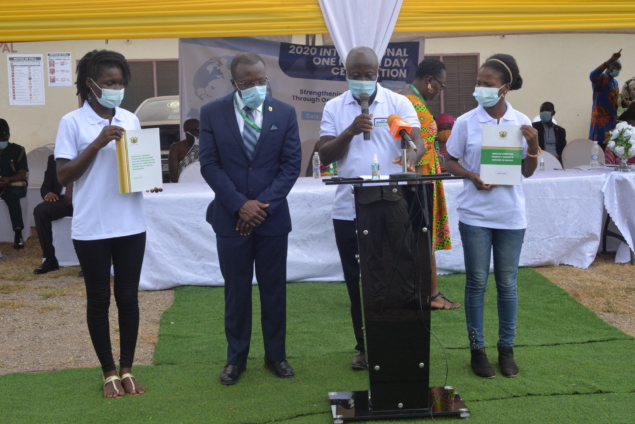The Ghana Health Service, in partnership with the US Aid Agency, USAID, has launched two risk communication documents to improve communication and social mobilization during public health emergencies.
The first document is the National Standard Operating Procedures for Risk Communication and Social Mobilization During Public Health Emergencies.
It provides systematic guidelines on the processes to be followed for coordination and timely risk communication and social mobilization responses during the preparedness, active response and post response phases of all public health emergencies.
The second is the Message Guide for Priority Zoonotic Diseases in Ghana. This is a tool used as reference guide for designing and sharing accurate and standardized messages about the prioritized zoonotic diseases in Ghana requiring greater attention from all stakeholders.
Pro Vice-Chancellor at the KNUST, Prof Ellis Owusu-Dabo, says “the tools will propel Ghana towards achieving a number of core capacities needed to effectively detect, prevent, detect and respond to infectious disease threats as measures during the joint External Evaluation conducted by the WHO for Ghana in 2017.”
He has assured of KNUST’s preparedness to ensure effective utilization of the tools.
“KNUST will continue to engage with One Health partners to strengthen research on One Health and orient members of the University community to enhance understanding and application of these tools,” he said.
Prof. Owusu-Dabo was speaking at the 2020 International One Health day at Boadi in the Ashanti region.
The goal of this year’s One Health Day is to build the cultural will necessary for a change in how one health challenges are assessed and addressed.
The One Health Technical Working Group with support from the development partners including FAO, WHO and USAID are at the final stage of formulating the National One Health Policy.
This will formalize collaboration and coordination among the human, animal and environment sectors.
Regional Manager for the Emergency Centre for Transboundary Animal Disease West and Central Africa of the FAO, Baba Soumare pledged their commitment to continuous collaboration with KNUST.
His speech was read by Dr. Garba Ahmed, FAO country team leader.
“The school of veterinary medicine participated in the FAO training for veterinary meat inspectors and butchers on meat inspection to ensure meat safety to the public. FAO will continue to explore other areas for collaboration with KNUST,” he said.
Latest Stories
-
CHAN 2024Q: Ghana’s Black Galaxies held by Nigeria in first-leg tie
19 minutes -
Dr Nduom hopeful defunct GN bank will be restored under Mahama administration
53 minutes -
Bridget Bonnie celebrates NDC Victory, champions hope for women and youth
1 hour -
Shamima Muslim urges youth to lead Ghana’s renewal at 18Plus4NDC anniversary
2 hours -
Akufo-Addo condemns post-election violence, blames NDC
2 hours -
DAMC, Free Food Company, to distribute 10,000 packs of food to street kids
3 hours -
Kwame Boafo Akuffo: Court ruling on re-collation flawed
4 hours -
Samuel Yaw Adusei: The strategist behind NDC’s electoral security in Ashanti region
4 hours -
I’m confident posterity will judge my performance well – Akufo-Addo
4 hours -
Syria’s minorities seek security as country charts new future
5 hours -
Prof. Nana Aba Appiah Amfo re-appointed as Vice-Chancellor of the University of Ghana
5 hours -
German police probe market attack security and warnings
5 hours -
Grief and anger in Magdeburg after Christmas market attack
5 hours -
Baltasar Coin becomes first Ghanaian meme coin to hit DEX Screener at $100K market cap
6 hours -
EC blames re-collation of disputed results on widespread lawlessness by party supporters
6 hours

